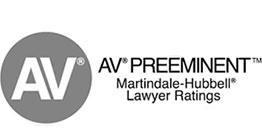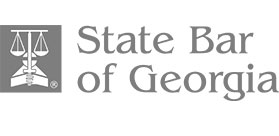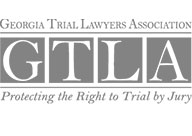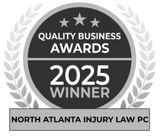Why Choose North Atlanta Injury Law for Your Milton Case?
Finding the right legal partner is about trust and local knowledge. At North Atlanta Injury Law, we’ve built our practice around what matters to you:
- A Team Rooted in North Atlanta: Our firm is dedicated to serving Milton and the surrounding communities. We know the Fulton County court system, we understand the traffic patterns on local roads, and we’re familiar with the challenges people in our area face. That local insight informs our strategy for your case.
- You Speak Directly with Your Lawyer: Your case will never be handed off to a case manager you’ve never met. You will have a direct line to your attorney—the person who knows every detail of your situation. We believe that open, consistent communication is the only way to build a strong case and a relationship of trust.
- We Invest in Your Case: We handle personal injury claims on a contingency fee basis. It’s simple: you pay nothing upfront. Our fee is a percentage of the money we win for you. If we don’t secure a financial recovery for you, you owe us nothing. This means our goals are perfectly aligned with yours from day one.
- An Honest, No-Strings-Attached Evaluation: Your first conversation with us is always free. We’ll listen, analyze the details of your accident, and give you a straightforward assessment of your options. We want you to walk away feeling informed and confident, whether you hire us or not.
Our approach is built to give you peace of mind. We take charge of the investigation, the evidence, and every conversation with the insurance companies, freeing you to pour your energy into getting better.
What Kind of Compensation Can You Pursue?
The purpose of a personal injury claim is to restore what was taken from you. While money can’t erase the experience, it can provide the stability needed to rebuild. In Georgia, compensation, legally known as “damages,” is divided into a few key types.
Economic Damages: Covering Every Bill and Lost Paycheck
These are the concrete, verifiable expenses that resulted from the accident. If there’s a paper trail—a bill, a receipt, a pay stub—it falls into this category. We work to document every single cost to show the full financial impact.
- Medical Expenses: This covers everything from the ambulance ride and initial emergency room visit to ongoing physical therapy, prescription drugs, and any medical devices you might need. We also calculate the cost of any future medical care your doctors anticipate.
- Lost Wages: You are entitled to payment for the income you lost while you were unable to work.
- Loss of Earning Capacity: If your injuries prevent you from returning to your old job or limit your ability to earn a living in the future, this compensation addresses that long-term financial gap.
Non-Economic Damages: The Real-Life Impact
Some losses don’t come with a price tag, but they are just as significant. These damages acknowledge the human cost of an injury—how it has rewritten your daily life.
- Pain and Suffering: This compensates you for the physical pain, discomfort, and emotional distress the injury and recovery process have caused.
- Loss of Enjoyment of Life: This addresses the ways the injury has stripped you of the ability to do the things you once loved. If you can no longer play golf, garden, or lift your grandchildren, this is meant to account for that loss.
Punitive Damages: A Tool for Accountability
In some situations, Georgia law allows for a third category of damages. Punitive damages are not about compensating you for a loss. Instead, they are designed to punish the at-fault party for exceptionally reckless behavior and to deter others from acting the same way.
These are reserved for cases where the defendant showed willful misconduct, malice, fraud, or a conscious indifference to the consequences. While most Georgia personal injury cases have a $250,000 cap on punitive damages, this cap does not apply if the defendant acted with a specific intent to cause harm or was under the influence of alcohol or drugs.
How Does Georgia’s “Modified Comparative Fault” Rule Affect Your Claim?
What happens if you were partially at fault for the accident? Georgia uses a rule that may still allow you to recover damages, as long as your share of the blame is less than 50%. This legal standard is detailed in O.C.G.A. § 51-12-33.
Here’s how it works: your final compensation award is reduced by your percentage of fault. However, if you are found 50% or more responsible, you are barred from recovering any compensation at all.
Insurance companies investigate every angle of an accident, looking for ways to argue you were at fault to reduce their payout. Our role is to build a powerful, fact-based case that keeps them accountable and ensures no amount of blame is unjustly shifted to you.
Common Causes of Injuries in the Milton Area
Accidents can happen anywhere, but certain local hotspots and conditions in Milton and North Fulton County present unique dangers.
Traffic Accidents on Key Local Roads
Routes like State Route 9 (Alpharetta Highway) and State Route 140 (Arnold Mill Road) are arteries for commuters and commercial trucks. During peak hours, the stop-and-go traffic frequently leads to rear-end collisions, often caused by distracted drivers.
Busy intersections, such as Birmingham Highway at Hopewell Road and the cluster of roads in downtown Crabapple, are known trouble spots. We see accidents here caused by failure to yield and drivers speeding up to beat a yellow light. The City of Milton has also identified the intersection of Bethany Bend and Highway 9 as one of its highest accident locations, prompting recent changes to improve safety.
Milton’s blend of rural, winding roads and new suburban growth creates distinct hazards. Many older roads lack shoulders and proper lighting, making pedestrians and cyclists difficult to see, while drivers new to the area may not be prepared for the sharp curves.
Premises Liability: When Property Owners Fail to Keep You Safe
Property owners in Milton’s shopping centers, restaurants, and parks have a legal duty to keep their premises reasonably safe. When they neglect this duty, people get hurt.
Common examples include:
- Slick floors in grocery stores or shops without “wet floor” signs.
- Poorly lit parking lots where potholes, cracks, or wheel stops are hidden in the shadows.
- Uneven sidewalks or cluttered aisles that create an obvious tripping hazard.
Workplace and Construction Accidents
With continued development across North Atlanta, construction sites remain dangerous environments. While workers’ compensation is the typical path for an on-the-job injury, a separate personal injury claim is sometimes possible.
This is called a third-party claim, and it may be brought against a negligent contractor, equipment maker, or another company on the site that is not your direct employer.
What Are the First Steps in a Personal Injury Case?
The legal journey starts long before anyone steps into a courtroom. The first steps are focused on methodical investigation and building a solid foundation for your claim. This ensures that when we present your case to the insurance company, it’s backed by undeniable evidence.
1. The Investigation: Uncovering the Facts
We begin by gathering every piece of information tied to your accident. This includes:
- The official police or incident report.
- Photos and videos of the scene, vehicle damage, and your injuries.
- Statements from any witnesses who saw what happened.
- A complete collection of your medical records and bills to show the full scope and cost of your injuries.
2. Formal Notification: Taking Control of Communication
Next, we send a formal letter of representation to the at-fault party’s insurance company. This letter does one simple thing: it instructs the insurer to direct all future communication to our office. This stops the adjuster from calling you, asking for a recorded statement, or pushing you to accept a lowball settlement before you even know how serious your injuries are.
3. Calculating Your Losses: The Full Picture
As mentioned above, we will compile all your economic and non-economic damages. A key part of this is waiting until you have reached what doctors call “Maximum Medical Improvement” (MMI). MMI is the point at which your doctor says you have recovered as much as you are expected to. Reaching MMI allows us to understand the full extent of your past, present, and future medical needs before we make any settlement demands.
4. The Demand and Negotiation: Making Your Case
With a complete picture of your damages, we assemble and submit a detailed demand package to the insurance company. This package presents the facts, establishes the other party’s liability, and provides a full accounting of your losses. This kicks off the negotiation process, which is where the vast majority of personal injury cases are resolved—without ever going to court.
How Insurance Companies Approach Injury Claims
It’s natural to assume that the at-fault party’s insurance company will do the right thing. But it’s a business, and that means it must balance paying legitimate claims with protecting its bottom line. This creates a conflict of interest.
Be aware of these common tactics:
- Requesting a Recorded Statement: An adjuster might call and ask to record your version of events. They are trained to ask questions in a way that might get you to say something that could be used to assign partial fault to you. It’s best to politely decline until you’ve spoken with an attorney.
- Making a Quick, Low Offer: An insurer may offer a fast settlement, sometimes before you even know the full extent of your injuries. It can be tempting, especially as bills start arriving. But accepting it closes your claim for good, even if your injuries require more treatment than you first thought.
- Questioning Your Medical Care: They might scrutinize your medical records to argue that a treatment was unnecessary or that your injuries existed before the accident. This is a standard tactic used to reduce the value of a claim.
Our job is to manage this entire process, counter these tactics with facts, and hold the insurance company accountable for the full value of your claim.
Frequently Asked Questions About Milton Personal Injury Claims
How long do I have to file a personal injury lawsuit in Georgia?
For most personal injury cases in Georgia, the statute of limitations is two years from the date of the injury. However, there are critical exceptions. For example, if the injured party is a minor, the two-year clock typically doesn’t start until their 18th birthday. Claims against government entities have much shorter deadlines—sometimes as little as six months. Because of these variations, it’s best to consult with a lawyer to determine the eligibility of your case.
What if the person who hit me was uninsured or underinsured?
If the at-fault driver has no insurance or not enough to cover your damages, you may be able to file a claim with your own insurance company through your Uninsured/Underinsured Motorist (UM/UIM) coverage. This is an optional coverage you purchase for this exact scenario. Georgia law requires insurers to offer it, and you must reject it in writing if you don’t want it. We can review your policy to see what protection you have.
What is the difference between a personal injury and a wrongful death claim?
A personal injury claim is brought by the person who was directly injured. A wrongful death claim arises when someone’s death is caused by the negligence of another. Under O.C.G.A. § 51-4-2, this claim is typically filed by the surviving spouse, children, or parents of the person who died to recover for the “full value of the life of the decedent.”
What evidence is most important for my personal injury claim?
The most crucial evidence often includes the official accident or incident report, photographs and videos of the scene and your injuries, contact information for any witnesses, and all your medical records from the incident. It is also helpful to keep a simple journal documenting your pain levels, medical appointments, and how the injuries affect your daily activities.
How is pain and suffering calculated in a Georgia settlement?
There is no single formula for calculating pain and suffering. Insurance companies and courts consider several factors, including the severity and permanence of your injuries, the amount of your medical bills, the length of your recovery, and the overall impact on your quality of life. An attorney builds a case to demonstrate this impact through medical expert testimony, your own statements, and testimony from friends and family.
Should I talk to the other party’s insurance adjuster?
We advise against giving a recorded statement to the at-fault party’s insurance adjuster without first speaking to a lawyer. Adjusters are trained to protect their company’s financial interests and may ask questions designed to minimize the value of your claim or shift blame to you. Your attorney can handle all communications with the insurer to protect your rights.
What if my injuries got worse after I initially saw a doctor?
You must seek follow-up medical care immediately and tell your doctor about any new or worsening symptoms. Delays in treatment or gaps in your medical records can give an insurance company an excuse to argue that your injuries are not as severe as you claim or that they resulted from something other than the accident. Consistent medical documentation is key.
Do I have to go to court to get compensation?
Probably not. The great majority of personal injury cases are settled through negotiations with the insurance company. A lawsuit is only filed if the insurer refuses to make a fair offer. We prepare every case as if it will go to trial, which puts us in the strongest possible negotiating position and often convinces the insurance company to settle.
How does a personal injury lawyer get paid?
We work on a contingency fee basis. This means our payment is a percentage of the settlement or verdict we obtain for you. If we are unable to secure compensation for you, you do not owe us any attorney’s fees. This system gives everyone access to high-quality legal help, regardless of their financial situation.
Take the Next Step with North Atlanta Injury Law
A clear understanding of your rights and a dedicated advocate in your corner can change everything. Let us handle the legal work so you can focus on what truly matters: your health and your family.
If you’re ready to talk, we’re ready to listen. Call North Atlanta Injury Law today for a free, confidential consultation at (770) 988-4000.










